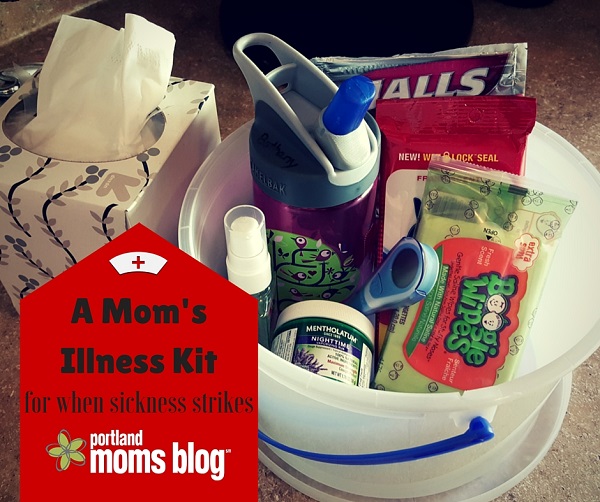Moms wear many hats, and regardless of whether or not you have any actual medical training, one of them is being the family nurse. It’s such an important role, I’ve compiled a little guide to creating your own illness kit. So, when germy sickness strikes your kids, you’ll be prepared.
![]() Note: I am not a doctor, so please remember the importance of asking your doctor before trying out new medications. Sometimes, for example, a seemingly minor illness like diarrhea can be indicative of a more serious issue, so at least give the office a call. This is doubly true if your child is less than two-years-old. Also, never give adult medicine to young children. Make sure you have a children’s formulation with appropriate dosing instructions to protect your child from an accidental overdose.
Note: I am not a doctor, so please remember the importance of asking your doctor before trying out new medications. Sometimes, for example, a seemingly minor illness like diarrhea can be indicative of a more serious issue, so at least give the office a call. This is doubly true if your child is less than two-years-old. Also, never give adult medicine to young children. Make sure you have a children’s formulation with appropriate dosing instructions to protect your child from an accidental overdose.
Mom’s Illness Kit Items:
1. Your Doctor’s Phone Number
And, while we’re here, keep the Poison Control number handy as well: 1-800-222-1222. They’re really nice and helpful, especially when your curious toddler gets into the medicine cabinet. (Ask me how I know…)
2. Medications:
Read labels thoroughly, follow directions exactly, and call your doctor’s office, ask-a-nurse line, or pharmacist if you’re unsure what medicines are right for your child, especially if they are already on medication. Ask your pediatrician or pharmacist what medicines your kid should steer clear from altogether, as well.
Pain reliever/fever reducer
By far the most versatile in the kit. The two main ones are ibuprofen and acetaminophen. I tend to use mostly ibuprofen, since acetaminophen can be hard on the liver, but I have also doubled up and given both (under doctor’s orders), alternating every four hours, for influenza relief. If your child is under age two, call your doctor for dosage information. Do NOT give aspirin to kids, as it can lead to severe complications.
Cold and cough medicine
This is kind of a tricky area. There are many different types of these formulations, and some can’t be given to kids under six, while other don’t appear to work better than a placebo anyway. So call your doctor for a recommendation. Personally, I usually just forgo treating drippy noses with medications, and just treat sore throats with ibuprofen, or disruptive coughs in older kids with a cough-suppressant like dextromethorphan and maybe guaifenesin if it’s a productive, phlegm-y cough.
For tummy issues
Since the “stomach flu” is self-limiting, I usually just wait it out. My kids are great poopers (a proud family tradition), so I don’t have experience with laxatives or anti-diarrhea meds to share with you. Chances are, if your kid has poop issues, you’ve either already talked to your doc, or should make an appointment to address it. If vomiting or diarrhea is accompanied by a fever, your child could have an infection, and they should see the doc right away. It’s worth noting that Pepto-Bismol and Kaopectate are not intended for use in children under 12.
Antihistamines
This is super important since allergies can develop out of the blue. I always have some diphenhydramine (brand name: Benadryl) on hand. Last year I gave it to my son when he was stung by a bee, since it helps with the itching. (If your child is having trouble talking or breathing, has a swollen tongue, or feels dizzy or faint, call 911 instead of relying on your OTC medicines!) Keeping an antihistamine topical cream on hand is also a good idea. If your child suffers from seasonal allergies, there are a plethora of OTC medications available, but be smart and run them by your dotor first.
Motion sickness medication
The brand Dramamine is the first thing most people think of, but beware, as there are two different drugs that are marketed as “Dramamine,” and only one of them is safe for younger kids. Look for dimenhydrinate (specifically the children’s formulation, if available) and stay clear of meclizine.
3. Tools:
General Items:
- Medicine dispensers, especially the dropper or syringe kind for younger kids
- Thermometer – Splurge on a good one!
- Leak-proof water bottle for staying hydrated
For gastrointestinal illnesses:
- An old bucket for catching vomit. Or you can order these fancy, disposable eme bags online
- Disinfectant wipes after a vomiting episode
- Hand sanitizer, mostly for you as you are coming into contact with all this nastiness
- Lots and lots of towels, especially if your child is too young to puke in a receptacle
- Training pants or disposable “bedtime underwear” is a good idea for a child suffering from diarrhea, especially when accompanied by simultaneous vomiting
- Apple juice or pediatric electrolyte liquid for when the vomiting calms down. But beware, too much sugary juice will aggravate diarrhea, so don’t overdo it. Use the B.R.A.T. diet to reintroduce solid foods (banana, rice, applesauce, toast)
- Baby monitor, which can be helpful if you aren’t always in earshot of your sick kid
For Respiratory illnesses:
- Tissues
- Baby or, our favorite brand, Boogie Wipes, for those who can’t wipe their own noses
- Humidifier for helping productive coughs with thick phlegm
- Chest rub that contains camphor and menthol
- Cough drops for older kids who won’t choke on them
- Lip balm to keep lips healthy during mouth-breathing




















Here’s a few things to add from my years of working for a pediatrician:
-Many pediatricians have a dosing hand-out for standard fever & cough and cold medications, so ask your’s if they do at your next visit. At the very least have them write down the current appropriate dose for these medications at every visit. This is especially important in children under 2 who’s weight is changing rapidly.
-Keep a bottle of nasal saline mist in your kit. It thins boogies and soothes irritated nasal passages. Buy the small bottle because it should be tossed after each illness.
-Hold onto that funny blue bulb sucker thingy you get when your babe is born. It works great for cleaning out goopy noses in infants. If you’re not sure how to use it, take it to your next pediatric appointment and ask for a demo.
-Apple sauce is great for diarrhea but apple juice will make it worse. If you absolutely can’t get a child to drink something else, then dilute apple juice to half strength.
-An infant under 2 months of age with a fever should be seen by a doctor.
-Toothbrushes! Please change your child’s toothbrush after an illness. Those bristles hold a lot of germs in a great growing environment of moisture.
In my recent encounter with a stomach virus – and first bout for baby! – I learned belatedly that hand sanitizer is ineffective at stopping either norovirus or rotovirus.
Comments are closed.